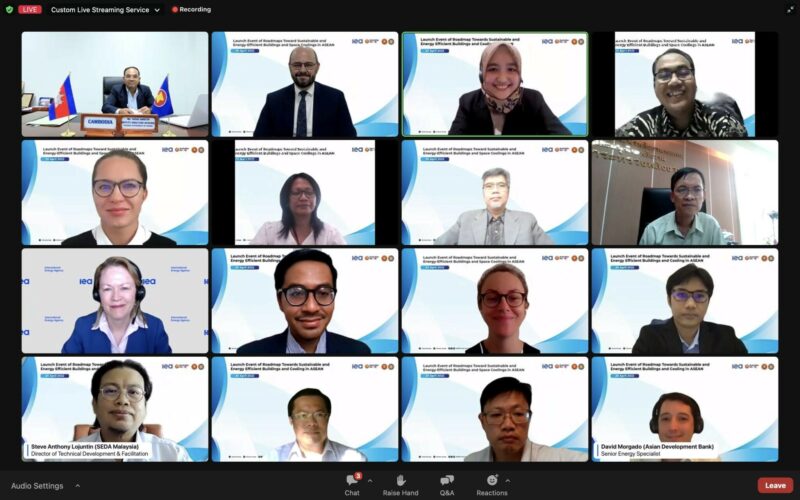Menu
20 April 2022ASEAN Centre for Energy, in collaboration with International Energy Agency (IEA), the ASEAN Secretariat (ASEC), and Energy Efficiency Sub-Sector and Conservation Network (EE&C-SSN) had successfully launched the Roadmaps Toward Sustainable and Energy-Efficient Buildings and Space Cooling in ASEAN. The development of these two roadmaps was supported by ASEAN-Australia Development Cooperation Program Phase II (AADCP II). The launch event was held virtually as a part of the official dissemination of the roadmaps during the 2022 EE&C-SSN its Associated Meetings, held on 20 April 2022 and attended by around 200 participants from 27 countries.
The event provided a brief overview of the key features of the roadmap and started a dialogue with ASEAN member states on their challenges to possibly implement the policy packages suggested in the roadmap, and with the expert community on identifying actions and near-term priorities collaboration for future implementation.

The event was opened by Mr. Nong Sareth, Deputy Director-General, on behalf of H.E Heng Kunleang, Director General of Energy & Alternative SOE Leader, Ministry of Mines and Energy, Cambodia, as chairman country of 2022 ASEAN Energy Cooperation. Followed by Mr. Ruangdet Panduang, Deputy Director-General, Department of Alternative Energy Development and Efficiency, Thailand as EE&C-SSN Coordinator; H.E. Will Nankervis, Ambassador of Australian Mission to ASEAN; and Mary Warlick, Deputy Executive Director, International Energy Agency. The Excellencies highlighted that the roadmaps in building and space cooling would be pivotal documents to assist policymakers in the ASEAN Member States in setting their national ambitious goals on energy efficiency in order to achieve net-zero carbon emission within the region. Furthermore, collaboration among other parties was recognised as an essential key takeaways for better implementation of the roadmaps.
Dr. Nuki Agya Utama, Executive Director of ASEAN Centre for Energy delivered the keynote address on Policy Perspectives and Expected Implication of the Roadmaps for ASEAN Region. He mentioned the regional growth on energy demand in building and space cooling would continue to rise as increasing incomes and living standards. Deploying EE&C measures and policies can anticipate the unexpected energy demand that has been predicted the CAGR in the commercial buildings would be 4.8% and 300 TWh of electricity demand from space cooling by 2040.
Ms. Ksenia Petrichenko, Energy Efficiency Policy Analyst, International Energy Agency (IEA) presented the key features of the Roadmap towards Sustainable and Energy-Efficient Space Cooling in ASEAN. She highlighted some current information about building and space cooling progress in ASEAN, projections, and provide key recommendations for policymakers that have been covered in the two roadmaps.
Panel Session
Mr. Septia Buntara Supendi, Sustainable, Renewable Energy and Energy Efficiency Manager, ASEAN Centre of Energy, as a moderator for this session. He reiterated the importance of the roadmaps for ASEAN and structured the dialogue on possible challenges and the need for stronger future collaboration. The speakers were from some ASEAN Member States (AMS), including Indonesia, Malaysia, and Singapore. The international partners for ASEAN were represented by the Asian Development Bank (ADB) and the United Nations Environment Programme (UNEP).
Mr. Supriyadi, Policy Analyst, Directorate of Energy Conservation, Ministry of Energy and Mineral Resources, Indonesia. He mentioned that currently there are no specific national building and space cooling roadmaps. However, Indonesia will continue to cooperate with international partners to improving the equipment’s energy efficiency policy and revising government regulations.
Mr. Steve Lojuntin, Director of Technical Development & Facilitation Division (TECH), Sustainable Energy Development Authority, Malaysia provided current status and relevant programme in the country. He stated that further coordination with different ministries on some policy changes needs to be taken in order to enable the implementation of the roadmaps.
Dr. Gau Chun Ping, Director, Green Building Technology Department, Environmental Sustainability Group, Building and Construction Authority of Singapore (BCA) and Mr Ng Pei Chien, Principal Engineer (Labelling and Standards), Climate Mitigation Division, Resource and Sustainability Group, National Environment Agency (NEA). They delivered an overview of Singapore regarding the current programme and plans that align with the roadmaps in the building and space cooling.
Mr. Atchariya Jangchay, Engineer, Department of Alternative Energy Development and Efficiency, Thailand. He mentioned that Thailand has ambitious goals toward net-zero carbon goals by 2050 and net-zero commitments by 2065 that could be driving factors in the two-roadmaps implementation. Also, he acknowledged that developing building energy codes and criteria, as well as harmonisation of MEPS testing standards, are pivotal in Thailand.
Mr. David Morgado, Senior Energy Specialist, ADB. He mentioned that ADB has been working on various projects within Asia on grants, technology transfers, credit enhancements, and any technical assistance in supporting countries toward low carbon targets. Recently, ADB has been working with country partners such as Sri Lanka, China, and Palau.
Ms. Lily Riahi, Coordinator of Cool Coalition, UNEP had highlighted financing efficiency in the residential sector is critical to bridging the incremental cost gap and achieving efforts beyond MEPS. She also pointed out that collaborations among multiple ministries in the national cooling actions are essential in order to support the market transformations.
Dr. Ksenia, IEA, summarised the key discussion of the panel session including these following items: i) data collection and accessibility need to be prioritized for better helps policy-making decisions, ii) supporting low-income households by deploying any related program on incentivizing cooling appliances, and iii) involvement among local stakeholders to set a robust policy package that could supports roadmaps implementation.
The session was concluded with closing remarks by Marie Gail de Sagon, Assistant Director, Head of Energy and Minerals Division, the ASEAN Secretariat. She thanked all for their participation in the event and believe that the achievements of ASEAN will be further improved with the implementation of the roadmaps.
Ms. Christina Aprilia, ACE, anchored the launch event, ensuring that event aligned with the ASEAN protocol and provided all-related event introduction/information.
To read more of the two roadmaps, please find it through the following links below
Roadmap towards Sustainable and Energy-Efficient Space Cooling in ASEAN
Roadmap for Energy-Efficient Buildings and Construction in ASEAN
